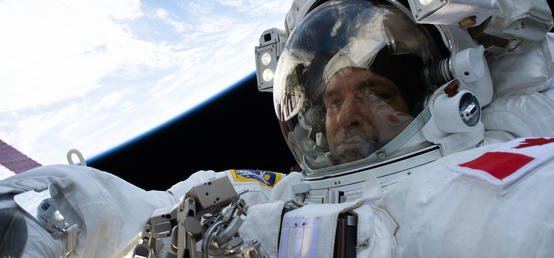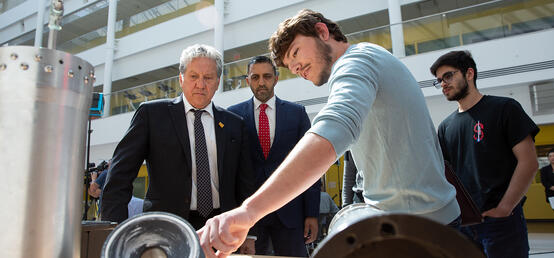The future of space exploration starts here.
The University of Calgary is a world leader in the development and application of Earth-Space technologies. Our research cuts across faculties and disciplines, integrating research strengths to create new technologies for improving global communication networks, environmental monitoring and space health.
Within the Canadian space tech community - which ranks amongst the top-three worldwide - Alberta leads some of the fastest-growing space-for-earth sectors and asserts the most space-active post-secondary community in the country.
Recent activity
Space and Defence Technologies Alberta, a new partnership between UCalgary, University of Alberta and University of Lethbridge, will establish Alberta as a global hub for innovation in space and defence technologies. It will address four main themes (Emerging Technologies, Sensing our Environment, Situational Awareness, and Threat Detection and Response) building on Alberta’s world-leading expertise and leadership in space domain solutions, sub-orbital technologies, and joint-domain intelligence.
UCalgary is a partner in NASA’s Geospace Dynamics Constellation (GDC), leading the GDC-Ground (GDC-G), a ground-based observing facility, measuring key space environment parameters from across Canada as NASA's spacecraft fly overhead. Data from GDC-G will be integrated into the NASA mission, enabling Canadian research and technology to address cutting-edge research questions, foster national and international partnerships, and advance Canada as a global scientific leader.
Ongoing projects
-
UCalgary’s Auroral Imaging Group, led by Dr. Eric Donovan and Dr. Emma Spanswick, leads the development and operation of the world’s most extensive network of ground-based instruments for observing the aurora. Their projects include SMILE — Solar wind Magnetosphere Ionosphere Link Explorer — a joint mission of the European Space Agency (ESA) and the Chinese Academy of Science (CAS) that focuses on the Earth’s magnetosphere and its minute-by-minute response to the solar wind.
-
UCalgary has scientific instruments aboard the ESA’s CASSIOPE and Swarm satellites, which are being used to enhance our understanding of space weather and Earth’s magnetic field. UCalgary also led the expansion of Swarm’s original mission to include auroral science with the creation of Swarn-Aurora, to build a bridge between Swarm data and optical images of the aurora collected primarily by ground-based imagers.
-
The upcoming RADICALS mission will include an x-ray imager, based on a prototype designed at UCalgary by Dr. Chistopher Cully. It will measure x-rays generated when the energetic particles strike the atmosphere, and map where the particles are hitting earth.
-
The Aerospace and Compressible Flow Research (AERO-CORE) Group, led by Dr. Craig Johansen, is researching the creation of greener and safer solid rocket fuel, as well as testing rocket performance at UCalgary’s Rothney Astrophysical Observatory.

Supporting aerospace innovation
The new Aerospace Innovation Hub (AIH) is a complete suite of support for aerospace start-ups to help them succeed and scale quickly. The AIH includes physical space and infrastructure, expert support, non-dilutive funding, corporate partnerships, and access to venture capital.
New Earth-Space Technologies (NEST)
New Earth-space technologies are capturing, analyzing and visualizing our Earth-space environment through unprecedented advances in sensors, platforms and systems. We are on the cusp of a technological revolution in our ability to sense and monitor our natural environment and built world — with widespread applications for humanity. Learn More.
Current Projects
Canadian Wayfinding Project
Astro Fly Study

Canadian Space Health Research Network (CSHRNet)
The University of Calgary is proud to be part of CSHRNet, a national non-profit organization recognized for its commitment to advancing research and training opportunities in space health. CSHRNet collaborates with academic experts, the private sector, and government agencies to expand efforts, fuel scientific discovery, and translate knowledge for the benefit of all Canadians. As an institution, we're dedicated to fostering initiatives that promote growth and career advancement in this field.
UCalgary Space Research News
Article
The sky is no limit: UCalgary’s legacy of space science innovation
Research group has been involved in more than 20 space missions since the 1970s
Article
UCalgary’s space weather network has eyes on the sky in Canada’s North
Dual-use sensors used to study science also support real-time systems for northern security, telecommunications and environmental monitoring
Article
AstroSat: Calgary scientists tapped by space agency to help decode galactic phenomena
UCalgary one of three universities awarded funding from the Canadian Space Agency to use satellites in "galactic archeology"
Article
UCalgary student hones multidisciplinary skills with Space Remote Sensing Lab
Scientists, engineers work together to study the near-Earth space environment
Article
Canada’s first space health research symposium launches at UCalgary
Gathering of global researchers will help astronauts and Earthlings alike, say organizers
Article
The sky’s the limit at UCalgary’s new Aerospace Innovation Hub
Federal government invests $2.5M to enhance growth of local aerospace and manufacturing sectors







